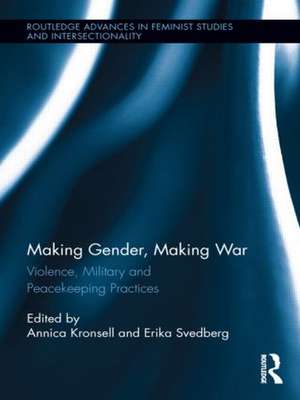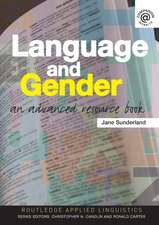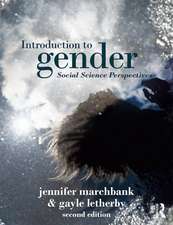Making Gender, Making War: Violence, Military and Peacekeeping Practices: Routledge Advances in Feminist Studies and Intersectionality
Editat de Annica Kronsell, Erika Svedbergen Limba Engleză Paperback – 23 mai 2013
| Toate formatele și edițiile | Preț | Express |
|---|---|---|
| Paperback (1) | 486.38 lei 43-57 zile | |
| Taylor & Francis – 23 mai 2013 | 486.38 lei 43-57 zile | |
| Hardback (1) | 1110.89 lei 43-57 zile | |
| Taylor & Francis – 23 sep 2011 | 1110.89 lei 43-57 zile |
Din seria Routledge Advances in Feminist Studies and Intersectionality
-
 Preț: 316.81 lei
Preț: 316.81 lei -
 Preț: 309.59 lei
Preț: 309.59 lei -
 Preț: 288.68 lei
Preț: 288.68 lei -
 Preț: 311.33 lei
Preț: 311.33 lei - 8%
 Preț: 388.40 lei
Preț: 388.40 lei - 5%
 Preț: 269.89 lei
Preț: 269.89 lei -
 Preț: 370.61 lei
Preț: 370.61 lei - 18%
 Preț: 1000.30 lei
Preț: 1000.30 lei -
 Preț: 432.34 lei
Preț: 432.34 lei - 31%
 Preț: 767.89 lei
Preț: 767.89 lei -
 Preț: 364.55 lei
Preț: 364.55 lei - 18%
 Preț: 1108.37 lei
Preț: 1108.37 lei -
 Preț: 367.83 lei
Preț: 367.83 lei -
 Preț: 416.22 lei
Preț: 416.22 lei - 18%
 Preț: 1113.60 lei
Preț: 1113.60 lei -
 Preț: 368.04 lei
Preț: 368.04 lei -
 Preț: 362.61 lei
Preț: 362.61 lei -
 Preț: 484.30 lei
Preț: 484.30 lei - 17%
 Preț: 244.91 lei
Preț: 244.91 lei -
 Preț: 416.22 lei
Preț: 416.22 lei -
 Preț: 478.71 lei
Preț: 478.71 lei - 18%
 Preț: 1002.36 lei
Preț: 1002.36 lei -
 Preț: 486.98 lei
Preț: 486.98 lei -
 Preț: 368.04 lei
Preț: 368.04 lei -
 Preț: 376.86 lei
Preț: 376.86 lei - 18%
 Preț: 1112.34 lei
Preț: 1112.34 lei - 18%
 Preț: 1055.51 lei
Preț: 1055.51 lei - 18%
 Preț: 1000.27 lei
Preț: 1000.27 lei -
 Preț: 389.38 lei
Preț: 389.38 lei -
 Preț: 366.30 lei
Preț: 366.30 lei -
 Preț: 381.62 lei
Preț: 381.62 lei - 18%
 Preț: 1000.27 lei
Preț: 1000.27 lei - 18%
 Preț: 1051.55 lei
Preț: 1051.55 lei
Preț: 486.38 lei
Nou
Puncte Express: 730
Preț estimativ în valută:
93.10€ • 101.16$ • 78.25£
93.10€ • 101.16$ • 78.25£
Carte tipărită la comandă
Livrare economică 21 aprilie-05 mai
Preluare comenzi: 021 569.72.76
Specificații
ISBN-13: 9780415849364
ISBN-10: 0415849365
Pagini: 268
Dimensiuni: 152 x 229 x 18 mm
Greutate: 0.39 kg
Ediția:1
Editura: Taylor & Francis
Colecția Routledge
Seria Routledge Advances in Feminist Studies and Intersectionality
Locul publicării:Oxford, United Kingdom
ISBN-10: 0415849365
Pagini: 268
Dimensiuni: 152 x 229 x 18 mm
Greutate: 0.39 kg
Ediția:1
Editura: Taylor & Francis
Colecția Routledge
Seria Routledge Advances in Feminist Studies and Intersectionality
Locul publicării:Oxford, United Kingdom
Public țintă
Postgraduate and UndergraduateCuprins
Preface: Those Difficult War Questions in Feminism Christine Sylvester Acknowledgments 1. Introduction: Making Gender, Making War Annica Kronsell and Erika Svedberg Theme 1: Conceptualizing Gender, Violence, Militarism 2. Gender Relations as Causal in Militarization and War: A Feminist Standpoint Cynthia Cockburn 3. Men/Masculinities: War/Militarism – Searching (for) the Obvious Connections? Jeff Hearn Theme 2: Making Gender and (Re)making the Nation 4. What Does a Bath Towel Have to Do with Security Policy? Gender Trouble in the Swedish Armed Forces Maud Eduards 5. Friendly War-Fighters and Invisible Women: Perceptions of Gender and Masculinities in the Norwegian Armed Forces on Missions Abroad Torunn Laugen Haaland 6. The ‘Rotten Report’ and the Reproduction of Masculinity, Nation and Security in Turkey Alp Biricik 7. Men Making Peace in the Name of Just War: The Case of Finland Pirjo Jukarainen Theme 3: Institutional Practices and Travelling Concepts 8. Analyzing UN & NATO Responses to Sexual Misconduct in Peacekeeping Operations Laura Hebert 9. A Gendered Protection for the ‘Victims’ of War: Mainstreaming Gender in Refugee Protection Jane Freedman 10. Experiences, Reflections, and Learning: Feminist Organizations, Security Discourse and SCR 1325 Laura McLeod Theme 4: Gender Subjectivity in the Organization of Violence 11. Nordic Women and International Crisis Management: A Politics of Hope? Elina Penttinen 12. Women in Militant Movements: (Un)comfortable Silences and Discursive Strategies Swati Parashar 13. In the Business of (In)security? Mavericks, Mercenaries and Masculinities in the Private Security Company Paul Higate 14. Re-Envisioning Masculinities in the Context of Conflict Transformation: The Gender Politics of Demilitarizing Northern Ireland Society Fidelma Ashe Conclusions 15. Is Feminism Being Co-Opted by Militarism? Annica Kronsell and Erika Svedberg
Descriere
Making Gender, Making War is a unique interdisciplinary edited collection which explores the social construction of gender, war-making and peacekeeping. It highlights the institutions and processes involved in the making of gender in terms of both men and women, masculinity and femininity. The "war question for feminism" marks a thematic red thread throughout; it is a call to students and scholars of feminism to take seriously and engage with the task of analyzing war. Contributors analyze how war-making is intertwined with the making of gender in a diversity of empirical case studies, organized around four themes: gender, violence and militarism; how the making of gender is connected to a (re)making of the nation through military practices; UN SCR 1325 and gender mainstreaming in institutional practices; and gender subjectivities in the organization of violence, exploring the notion of violent women and non-violent men.
















